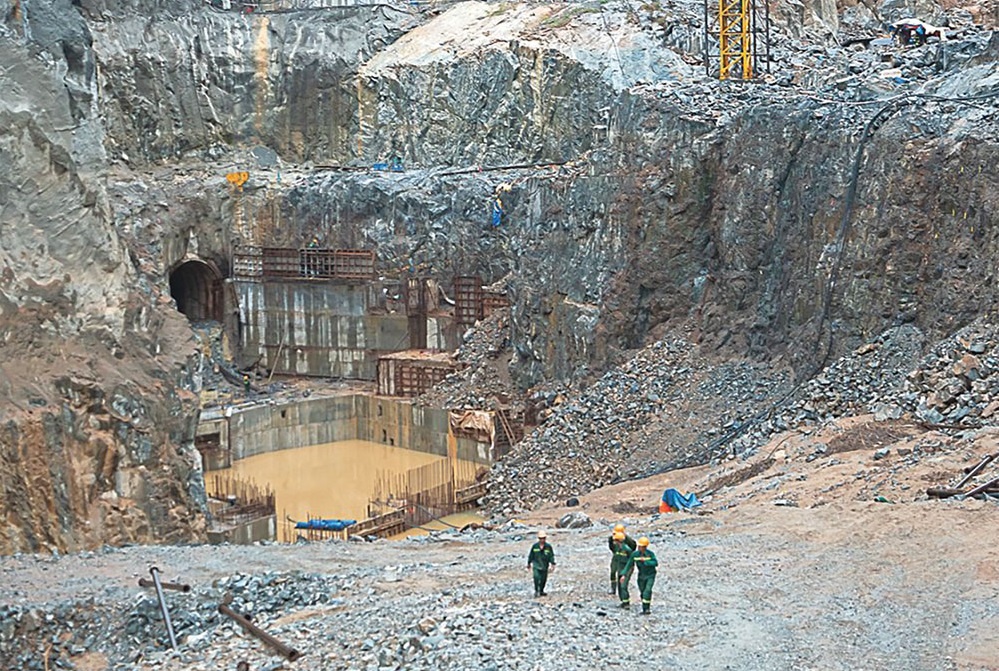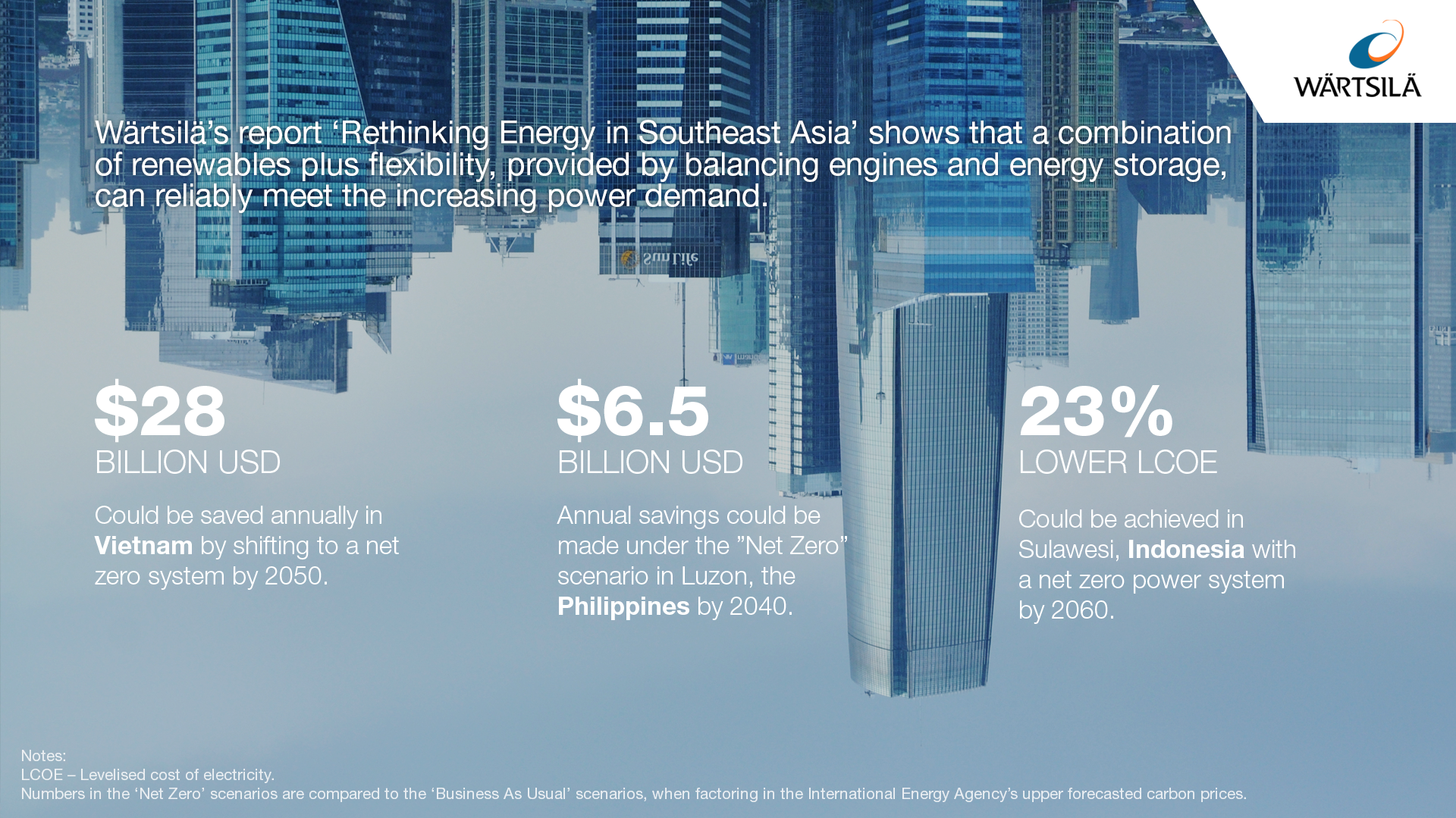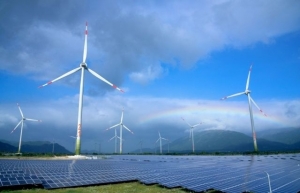EU getting involved with net-zero push
Engineers at the Ialy hydropower plant expansion project in the Central Highlands province of Gia Lai are working at full speed so that the plant can officially generate electricity in 2024.
 |
| The expansion of the Ialy hydropower plant is partly financed by the EU |
Many construction items have been completed beyond schedule by 1-3 months while quality and safety are ensured following strictly the regulations of investors, Electricity of Vietnam (EVN) and the French Development Agency in Vietnam (AFD). “Much remain to be done for the plant to become operational,” Ambassador of the European Union to Vietnam Giorgio Aliberti said while two weeks ago he visited the project. “We’re happy that this plant can help provide more power for the region.”
The existing plant, constructed in 1993 and became operational in 2002, had a total capacity of 720MW with four turbines, could produce 3,650 kWh annually. However, since June 2021, this plant has been expanded with another two turbines of 360MW, at a cost of an estimated €242 million ($249.6 million), and the turbines are planned to be in operation by 2024.
The Vietnamese government expects electricity demand to increase by 8-10 per cent annually over the 2016-2030 period. To meet this demand, it prioritises a rise in installed capacity of power sources, and develops and optimises renewable energy projects.
In line with targets, the AFD has granted the project a non-sovereign loan €74.7 million ($77 million), which will be used to finance hydro mechanical and electromechanical equipment. The remainder will be financed by counterpart fund and domestic loans.
“The extension of the Ialy plant will help increase EVN’s production capacity from renewable resources to meet the growing demand for electricity, particularly during peak demand, while reducing greenhouse gas (GHG) emissions,” said an AFD document on the project. “A total of 360MW of renewable energy will be expected to connect to the distribution grid, replacing fossil production (estimated at 220GWh a year), and help to avoid nearly 68 kilotonnes of CO2 per year.”
Ambassador Aliberti said the expansion project is among many other ones that the AFD and the EU are and will continue supporting Vietnam in energy transition to meet the country’s goals of net-zero emissions by 2050 as committed internationally.
“The EU believe that the future of energy in Vietnam is renewable energy. The EU – with our experience in green transition – is here to provide more support and expertise in a reinforcing way with smart grid transmission development and tapping into Vietnam’s potentials in clean energy, especially hydropower other renewable energy. This is all to make the energy transition happen while ensuring access to affordable energy for all and protecting Vietnam’s competitiveness at local, as well as international level,” he said.
He said that the EU and its member states within Team Europe approach is continuing to provide more demand-based support through profound discussion between the EU and Vietnamese partners.
The EU continues the financial support for the operation of the Vietnam Energy Partnership Group and is working with the Ministry of Industry and Trade on a roadmap for the long-term financial sustainability of the partnership, including strategies to raise additional, public, private, and development partners funds to sustain its operations.
According to the Delegation of the European Union to Vietnam, since 1990, Vietnam’s GHG emissions have steeply increased. Coal burning, the most CO2 intensive fossil fuel mostly used to produce electricity, has tripled over the last 10 years.
“Unless action is taken, it is to increase further. The Vietnamese government is now seriously exploring ways to curb this trend to help meet its commitment of net-zero emissions by 2050,” the delegation said in a statement.
Recognising the significance of this commitment, Executive Vice President of the European Commission Frans Timmermans said, “Vietnam has taken an ambitious step in aiming for net-zero emissions by 2050. Meeting this target is a huge task, and requires first cancelling planned projects for unabated coal-fired power generation and phasing down coal power generation.”
The EU stands ready to continue its support to Vietnam in its green transition and the nation has tremendous potential for further renewable energy development, Timmermans added. “We have discussed ways in which Europe’s own experience, expertise and financial support, for instance on improving the power grid, enhancing predictable regulatory frameworks and investing in energy storage, can help accelerate this transition,” he said.
Timmermans visited Vietnam in February to follow up on the country’s important pledges at the global climate summit in Glasgow and to discuss where the European Union can support Vietnam in its efforts to reduce its GHG emissions fast.
Vietnam is one of the countries most vulnerable to the effects of climate change, particularly the Mekong Delta. Additional investments in climate change adaptation and climate resilience, including nature-based solutions, are urgently needed.
“We are all together in the fight against the climate and biodiversity crises.” Timmermans said. “Citizens’ participation and non-state actors engagement help to forge broad social consensus and are crucial for the success of our efforts.”
 | Vietnam's smooth transition to net zero by 2050 Wärtsilä has revealed that renewable-based power systems, backed by grid balancing engines and energy storage, can enable Vietnam to reach net zero by mid-century whilst cutting the levelled cost of electricity (LCOE) by 20 per cent when taking into account future carbon taxes. |
 | International partners commit to help Vietnam realising net zero emissions The United Nations and development partners, during discussions with Vietnamese ministries and sectors, expressed their willingness to support Vietnam in achieving the goal of net zero emission and energy transition. |
 | Leveraging carbon markets for Vietnam’s climate commitments Vietnam has identified the importance of shifting away from traditional models of growth in order to sustain the development gains of recent decades. The country adopted its National Green Growth Strategy in 2021 and developed the Green Growth Action Plan the following year. In 2021, Vietnam made a commitment to bring net emissions to zero by the middle of the century. |
What the stars mean:
★ Poor ★ ★ Promising ★★★ Good ★★★★ Very good ★★★★★ Exceptional
Related Contents
Latest News
More News
- Trung Nam-Sideros River consortium wins bid for LNG venture (January 30, 2026 | 11:16)
- Vietnam moves towards market-based fuel management with E10 rollout (January 30, 2026 | 11:10)
- Envision Energy, REE Group partner on 128MW wind projects (January 30, 2026 | 10:58)
- Vingroup consults on carbon credits for electric vehicle charging network (January 28, 2026 | 11:04)
- Bac Ai Pumped Storage Hydropower Plant to enter peak construction phase (January 27, 2026 | 08:00)
- ASEAN could scale up sustainable aviation fuel by 2050 (January 24, 2026 | 10:19)
- 64,000 hectares of sea allocated for offshore wind surveys (January 22, 2026 | 20:23)
- EVN secures financing for Quang Trach II LNG power plant (January 17, 2026 | 15:55)
- PC1 teams up with DENZAI on regional wind projects (January 16, 2026 | 21:18)
- Innovation and ESG practices drive green transition in the digital era (January 16, 2026 | 16:51)

 Tag:
Tag:




















 Mobile Version
Mobile Version